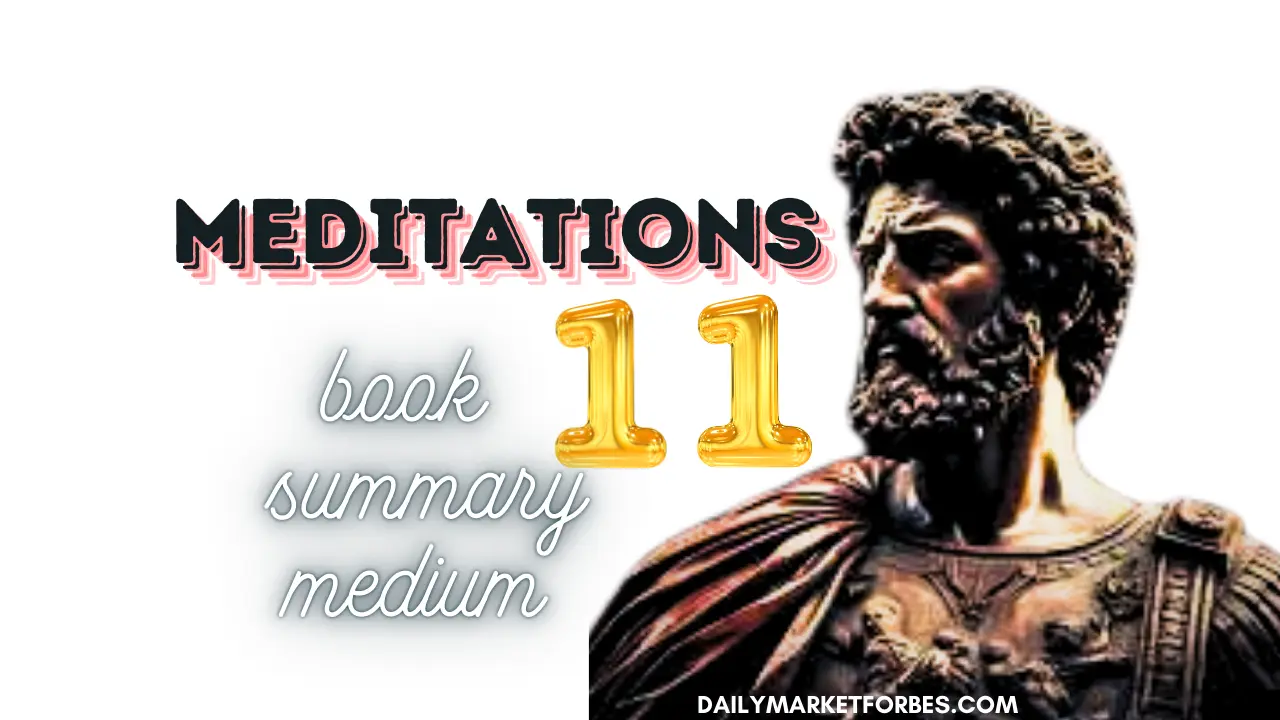Introduction of Meditations Book 11 Summary
Marcus Aurelius, the Roman Emperor from 161 to 180 AD (Meditations Book 11 Summary), is widely regarded as one of history’s most prominent Stoic philosophers. His work, “Meditations,” is a series of personal writings where he reflects on his life, philosophy, and the challenges of ruling an empire. Among the 12 books of “Meditations,” Book 11 holds a special place due to its profound exploration of human nature, virtue, and the Stoic way of life.
In this article, we will explore the essential themes of Book 11, breaking down its wisdom into accessible insights. Whether you’re a seasoned student of philosophy or just beginning your journey, this summary will help you understand the key lessons Marcus Aurelius offers in Book 11 of “Meditations.”

Understanding Stoicism
Before diving into Book 11, it’s essential to grasp the fundamentals of Stoicism, the philosophy that underpins Marcus Aurelius’ thoughts. Stoicism, founded in Athens by Zeno of Citium around 300 BC, teaches that the path to happiness is found in accepting the moment as it is, practicing virtue, and cultivating wisdom. Stoicism emphasizes rationality, self-control, and the importance of living in harmony with nature.
Marcus Aurelius, a Stoic philosopher, used “Meditations” as a means of self-reflection and guidance, often addressing himself in his writings. Book 11 is a testament to his commitment to Stoic principles, offering readers a window into his thoughts on life, leadership, and personal conduct.
The Structure of Book 11
Book 11 of “Meditations” is structured as a collection of aphorisms, each one a standalone piece of wisdom. Unlike other books in “Meditations,” which often follow a thematic progression, Book 11 is more eclectic, touching on various aspects of Stoic philosophy. The book doesn’t follow a strict narrative but instead offers reflections on topics that were likely of immediate concern to Marcus at the time of writing.
Theme 1: The Nature of the Self
One of the central themes in Book 11 is the exploration of the self. Marcus Aurelius delves into the importance of self-awareness and self-discipline, urging readers to understand their own nature and maintain control over their actions. He reflects on the idea that one’s character is shaped by their thoughts and decisions, emphasizing the need for continuous self-improvement.
Marcus highlights the importance of recognizing one’s role in the larger context of life, encouraging a focus on personal development and moral integrity. By maintaining self-control and striving for self-awareness, one can achieve a more balanced and fulfilling life.
Theme 2: The Impermanence of Life
Another significant theme in Book 11 is the impermanence of life. Marcus Aurelius repeatedly reminds himself—and, by extension, his readers—of the transient nature of existence. He reflects on the inevitability of death and the futility of clinging to material possessions or worldly status.
This theme serves as a reminder to focus on what truly matters: living a life of virtue and wisdom. Marcus encourages readers to accept the temporary nature of life and to approach each day with a sense of purpose and mindfulness, knowing that time is fleeting.

Theme 3: The Interconnectedness of All Things
Marcus Aurelius also explores the concept of interconnectedness in Book 11. He reflects on the idea that all things in the universe are connected and that every action has a ripple effect. This theme is closely tied to the Stoic belief in living according to nature and understanding one’s place within the cosmos.
By recognizing the unity of all things, Marcus argues that individuals should strive to live in harmony with others and the world around them. This interconnectedness also reinforces the idea of cosmic citizenship, where each person plays a role in the larger scheme of things, contributing to the greater good.
Theme 4: Duty and Responsibility
Duty and responsibility are recurring motifs in Book 11. Marcus Aurelius emphasizes the importance of fulfilling one’s obligations, both to oneself and to society. He reflects on his role as an emperor and the heavy responsibilities that come with leadership.
Marcus’ thoughts on duty are not limited to his position as a ruler; he extends these principles to every aspect of life, encouraging readers to act with integrity and purpose. By fulfilling one’s duties with diligence and honor, Marcus believes that individuals can lead a life that is both meaningful and virtuous.
Theme 5: Virtue as a Guiding Principle
Virtue, a cornerstone of Stoic philosophy, is a central focus in Book 11. Marcus Aurelius repeatedly emphasizes the importance of living a virtuous life, where actions are guided by moral principles rather than personal gain. He encourages readers to cultivate virtues such as wisdom, courage, justice, and temperance.
For Marcus, virtue is not just an abstract concept but a practical guide for daily living. He urges readers to make virtue the foundation of their decisions, leading to a life of purpose and fulfillment.
Practical Wisdom in Book 11
One of the most compelling aspects of Book 11 is its practical wisdom. Marcus Aurelius doesn’t just offer philosophical musings; he provides actionable advice for dealing with life’s challenges. From handling difficult people to maintaining focus on one’s goals, Marcus offers insights that are as relevant today as they were in ancient Rome.
For example, Marcus advises against allowing external events to disturb one’s inner peace, advocating for a mindset that remains calm and composed in the face of adversity. This practical approach makes Stoic philosophy accessible and applicable to everyday life.
Marcus Aurelius’ Views on Death
Marcus Aurelius’ thoughts on death in Book 11 are a continuation of the Stoic tradition of memento mori or the contemplation of mortality. He encourages readers to view death as a natural part of life, something that should neither be feared nor avoided. Instead, Marcus advocates for accepting death with dignity and wisdom, recognizing it as the final chapter in the journey of life.
This acceptance of mortality is not morbid but liberating, as it allows individuals to focus on living well in the time they have. Marcus’ reflections on death serve as a reminder to live each day fully, with a clear understanding of life’s impermanence.
The Role of Rationality and Logic
Rationality and logic are central to Marcus Aurelius’ philosophy, and they feature prominently in Book 11. Marcus often emphasizes the importance of using reason to navigate life’s complexities, advocating for a logical approach to decision-making.
He argues that by relying on rational thought, individuals can overcome emotional disturbances and maintain a sense of inner peace.
Meditations Book 11 is a profound exploration of Stoic philosophy and Marcus Aurelius’ personal reflections on life, duty, and virtue. This book offers invaluable insights into the human condition, providing practical wisdom for navigating challenges and finding inner peace.
By delving into the thoughts of a revered Roman emperor and philosopher, readers gain a unique perspective on leadership, ethics, and the pursuit of a meaningful life. The book’s emphasis on self-control, reason, and acceptance of fate continues to resonate with contemporary audiences, offering timeless guidance for personal growth and resilience.
Conclusion
Meditations Book 11 Summary serves as a timeless testament to the enduring power of Stoic philosophy. Marcus Aurelius’ introspective musings offer a roadmap for cultivating inner strength, resilience, and a sense of purpose. By examining the complexities of human nature and the impermanence of life, the emperor invites readers to embrace a life of virtue and tranquility.
The book’s emphasis on duty, reason, and self-discipline remains highly relevant in today’s world, providing a valuable framework for navigating challenges and finding meaning in life. As readers engage with the text, they are encouraged to reflect on their own values, priorities, and relationships with others.
Ultimately, Meditations Book 11 is a powerful reminder that true happiness and fulfillment come from within and that by cultivating a strong moral compass, individuals can lead meaningful and fulfilling lives.
For more articles and updates, kindly click on dailymarketforbes.









Be First to Comment